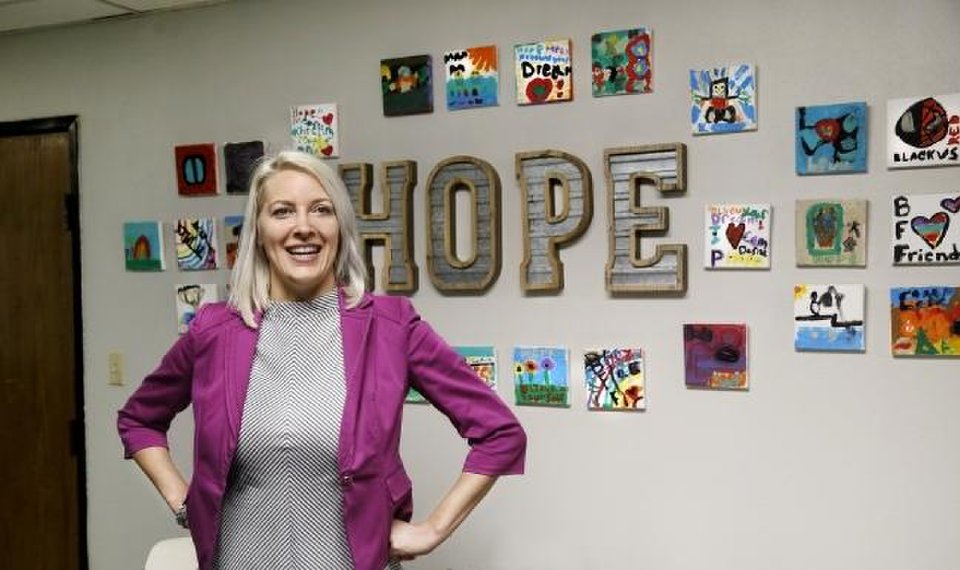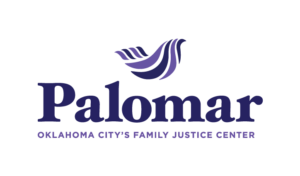The Oklahoman: Family justice center makes pitch for MAPS 4 inclusion
By Darla Slipke
Published: July 10, 2019

That’s the equivalent of one in six households every year, Kim Garrett, CEO of Palomar, Oklahoma City’s family justice center, said Tuesday during the first of four city council special meetings to hear presentations about potential MAPS 4 projects.
Palomar is seeking MAPS 4 funding to build a new, permanent facility. The family justice center, which opened in 2017, brings a variety of agencies together under one roof to provide comprehensive services to children and survivors of domestic violence, sexual assault, stalking, human trafficking and elder abuse.
“Family violence is happening in more homes than you think,” Garrett told council members. “Yes, in your neighborhood, too. And if it’s not happening in your home, statistically it’s happening in a home you can see from your front porch.”
Palomar’s current facility is temporary, and officials said they are outgrowing the space. The new proposed building would serve as a community healing and restoration center for survivors and their children, where Palomar could expand services, welcome more partner agencies and meet survivors’ holistic and long-term needs, Garrett said.
Since opening, Palomar has had almost 24,000 client visits. The demand for coordinated services has exceeded everybody’s expectations, Garrett said. Oklahoma ranks as one of the worst states for childhood adversity and trauma. The state also has high rates of domestic violence.
“Despite everyone’s hard work, we are not meeting all of our community’s needs,” Garrett said. “We need to expand our framework and bring in more trauma services, community space, the faith-based community, cultural services and medical services.”
Garrett presented preliminary plans Tuesday for an approximately 80,000 square foot building, which would increase Palomar’s capacity by two-thirds. If the location remained in the Midtown area, Garrett projected it would cost about $37 million to design, construct and furnish the facility.
A philanthropic business owner is interested in donating land near Palomar’s current location, and Palomar would be able to share a parking structure, Garrett said. If the building was located somewhere else in the city, Garrett estimated it would cost about $43.9 million. That cost estimate includes the cost of land acquisition and a parking structure.
Palomar officials would prefer to stay in Midtown because of the central location, which is safe, easily accessible and destigmatizes the taboo of seeking help, Garrett said.
Plans for the new building include providing more therapy for clients, providing trauma-informed day care, mentoring, educational programming and parental support to help children impacted by trauma, incorporating a chapel with a multidenominational chaplaincy program and providing integrated medical services, including a pharmacy, lab and medical clinic, Garrett said.
Officials envision the center becoming a regional training center for cutting-edge trauma-informed care and collaborative work, Garrett said. They’d like to partner with local universities to hold classes at Palomar and develop a simulation training lab for professionals, among other goals, she said.
For every $1 of MAPS funding Palomar has requested, the city’s return on investment could be $12.67 every year, Garrett said.
Dozens of people wearing purple shirts in support of Palomar filled the city council chambers for Tuesday’s presentation. Several survivors addressed the council and urged city leaders to include Palomar in MAPS 4.
One domestic violence survivor, who identified herself as a senior vice president of public relations for a large company in Oklahoma City, spoke about the fear she felt when escaping a violent relationship, a fear that continues to this day.
“If there had been a place like Palomar where I could have gone to fill out a (Victim Protective Order), meet with the police officer, take my baby and be surrounded by care, I think I would have felt hope that day,” she said, her voice breaking with emotion as she shared her story. “I was terrified.”
There is no face of domestic violence, no one type of person who is abused, the woman said.
The number of domestic-related 911 calls last year in Oklahoma City — more than 32,000 — is the equivalent of filling Chesapeake Energy Arena twice, Garrett said.
Calls for help come from people in all walks of life. They have included a pregnant woman who was being physically and sexually abused by her husband, Garrett said. The woman made $11 an hour. If she left with her two young children, she would be facing poverty and homelessness, Garrett said.
They have included a 9-year-old boy who hung posters of superheroes on the wall in hopes that they would jump out and protect him when his dad came home to hurt him, Garrett said. They’ve included an elderly couple who hid in their bedroom every night from their rage-filled son.
“This is affecting every ward in our community,” Garrett said. ” … Because of the shame and stigma, survivors often don’t share and are hidden in plain sight. Survivors are not always who you’d think.”
City Councilman James Cooper said he was struck by the story of the boy who hung posters of superheroes on his wall hoping they would come save him.
“It hit me especially hard as a council person but also as someone who grew up not with superheroes on my wall but with the final girls in slasher movies,” Cooper said. ” … Those were the heroes I was waiting every day to come save my mother, my sister and me from the alcoholic outbursts that my father inflicted on us.”
Cooper said the services Palomar provides are critical.
“There need to be more people who hear that there is hope for them, that they are not a statistic,” he said.


